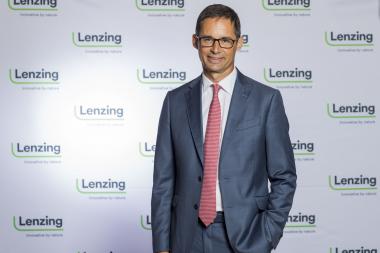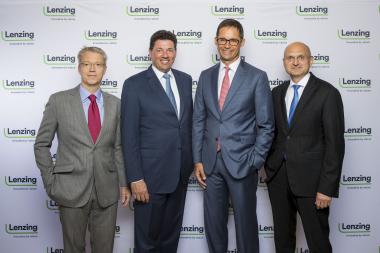Beaulieu Fibres International: Cost-effective solution for fully recyclable, latex-free, sustainable carpets
- Latex-free: UltraBond allows 100% recyclable thermal bonded nonwovens
- Sustainability & cost-efficiency: significant reductions in CO2 emissions and energy and water consumption for manufacturers of needlepunched exhibition & contract flooring
- UltraBond debuts at Domotex 2019 Stand B56 Hall 11
Beaulieu Fibres International (BFI) unveils a unique opportunity for carpet manufacturers to create fully recyclable needlepunch carpets, and benefit from production and resource savings, without influencing performance.
Launched at Domotex 2019, new UltraBond is a patented polyolefin bonding staple fibre that eliminates the need for latex or other chemical binders to bind nonwovens. It opens up a new path for creating 100% polypropylene (PP) needlepunch carpets which meet the same performance requirements as traditional latex-bonded carpets while reducing the end-of-life environmental impact. Functional properties such as pilling resistance, resistance to wear and abrasion, and also UV resistance are guaranteed.
Using UltraBond manufacturers finally gain the potential to cost-efficiently produce 100% recyclable carpets. In addition to the general benefits of making recycled PP available for the plastics production chain and reduced waste generation, environmental advantages and financial savings arise from a total lack of water and less energy use. As a 100% dry process, thermal bonding uses no water and results in a total absence of waste water. There is also a reduction in the VOC level of the carpet. This all leads to a significant reduction in a needlepunch carpet’s ecological footprint.
The sustainability benefits are quantified through lifecycle analysis (LCA) of an exhibition carpet application – among the primary applications for needlepunch carpets. Evaluations show that the absence of water consumption directly translates into a large energy saving of 93% when using UltraBond compared to a latex bonding solution, and also a potential annual water saving of over 20 million litres for 100 million m2 of exhibition applications in the EU. Without the addition of any other bonding agent, CO2 emissions are reduced by 35% over the full production process.
Karena Cancilleri, Vice President Beaulieu Engineered Products, Beaulieu International Group, commented, “Recyclability and achieving a greener, more cost-effective production process without compromising on current performance levels are significant unsolved topics within today’s carpet industry. By eliminating the need for latex and chemical binders through UltraBond, we offer needlepunch manufacturers a breakthrough they have been looking for that boosts environmental and economic sustainability. We see textile flooring as just the beginning. Together with our customers, we look forward to exploring the potential of this unique thermal bonding fibre in other applications such as laminated nonwovens or as an alternative to dry powders.”
Discover more about UltraBond from the Beaulieu Fibres International team at Stand B56 Hall 11, Domotex 2019 in Hannover, Germany from January 11-14, 2019.
Beaulieu Fibres International
EMG















